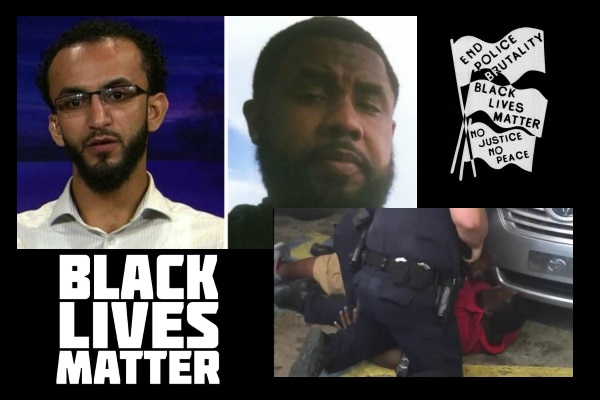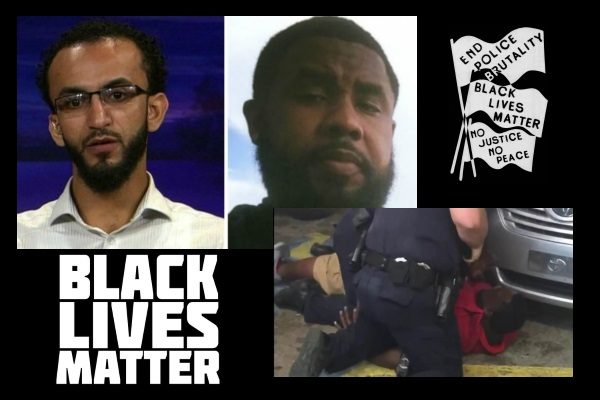

By: Sarah Lazare
Source: AlterNet
Abdullah Muflahi is a Yemen-born Baton Rouge resident who owns a popular Triple S Food Mart in the Louisiana capital. Chris LeDay is a Georgia resident and Air Force veteran born and raised in Baton Rouge.
Both men played critical roles in exposing the brutal police killing of African-American man Alton Sterling, just outside of Muflahi’s store. And both say that, because they revealed the murder, they quickly became the next police targets, hit with retaliatory detention, abuse and degrading treatment that threw their lives into upheaval.
“They treated me like I was a criminal,” Muflahi told AlterNet, “I was just a witness.”
Muflahi used his phone to record the police killing of Sterling, whom he describes as a “good friend,” and the shop owner is responsible for the second video of the shooting. The footage shows that that Sterling was not holding a gun or posing a threat when police officer Blane Salamoni shot him six times while he was pinned to the ground, debunking a key narrative perpetuated by Salamoni and Howie Lake—the other officer involved in the incident.
Watching his friend die would turn out to be only the beginning of Muflahi’s nightmare. According to a lawsuit filed earlier this week by his attorney, Joel Porter, “Immediately after the killing of Mr. Sterling officers came inside Triple S Food Mart and without a warrant confiscated the entire store security system and took Plaintiff Muflahi into custody.”
The petition, which names several officers and was emailed to AlterNet, charges that police “then illegally placed Mr. Muflahi into custody, confiscated his cell phone and illegally locked him in the back of a police vehicle and detained him there for approximately four hours.”
During that period, Muflahi was not even permitted to use the bathroom in his own store, forced to relieve himself on the side of the building “in full view of the public,” the lawsuit states.
Without presenting legal justification, police then prevented Muflahi from entering the premises of his own store, the petition charges. Up to six hours later, Muflahi was finally issued a warrant, but the lawsuit states that it “only authorized a search of the video surveillance at the scene for evidence and did not authorize a search of the building or the physical removal of the equipment both of which had already transpired when the warrant was issued.”
“The way they locked me in the hot back seat of the car, didn’t let me go back into the store to use the bathroom and made me use the bathroom on the side of the building, I don’t think that’s the way they are supposed to treat me,” said Muflahi. “I felt like I was getting locked up for something I never did.”
“First my mind was trying to go through what had just happened, seeing my friend killed, and then me getting treated that way was horrible,” he continued. “I didn’t know what the hell to think or do. I was confused, lost and had no phone to talk to anyone. I couldn’t even get a bottle of water.”
“Not only did Sterling lose his life on July 5, but my client also lost his liberty,” Porter told AlterNet. “They were attempting to put a lid on everything. They illegally took surveillance camera footage that shows what happened. They would have buried it if my client had not taped it from his phone. My client feels that they were trying to intimidate him.”
Muflahi, whose store has since become a makeshift shrine to the deceased Sterling, is unfortunately not alone.
Because LeDay hails from Baton Rouge, he got word of a separate videodepicting the police killing of Alton Sterling. Thanks to his history as a local music producer, LeDay has thousands of followers on Twitter, Facebook and Instagram. When he was notified of the footage by Baton Rouge contacts, he decided he would attempt to make the video go viral and promptly published it on all three online platforms.
“I wanted it to go viral because the situation was so gruesome, and I feel like they [police] tried to cover their tracks,” LeDay told AlterNet. “That’s why they were in the store and confiscated the surveillance footage without a warrant.”
“I saw an opportunity to get some justice for the sterling family, and that’s what I wanted to do,” he added, noting that one of his mother’s best friends is Alton Sterling’s aunt.
LeDay, who ended up being the first to post a video of the police killing of Sterling, would be arrested 24 hours after making this decision. An aerospace ground equipment technician at Dobbins Air Reserve Base in Marietta, Georgia, LeDay wrote on his Facebook page just one day later, “I just made it to my job on base and I’m being detained. They said I fit the description of someone and won’t tell me anything else. If anything happens I did not resist! Please be aware!”
When attempting to cross a checkpoint to work, LeDay was detained by “at least ten military police officers with guns, including a few with M-16s, all of them surrounding him in case he tried to make a run for it,” wrote Carlos Miller,reporting for Photography Is Not a Crime.
LeDay was first informed that he was detained for assault and battery but later told that the charges related to unpaid parking tickets. He says he spent the night in jail and paid $1,231 before being released—and was forced to wear handcuffs and leg shackles during his detention. “It was embarrassing to be shackled,” he said.
His ordeal did not stop there. LeDay says that he is still not allowed on base and believes that his employment is in limbo. “I still don’t have my job back, it’s still up in the air,” he said. “I’m missing wages.”
“I do believe I was penalized for telling the truth, for shedding light on the situation,” LeDay continued. “I believe that cops stick together. To me, they are the most organized gang in the country.”
The reporter, Carlos Miller, told AlterNet that LeDay’s treatment reflects ” an ongoing pattern of retaliation. It is very obvious in this case when, 24 hours after he posted the video he was picked up on an unpaid traffic fine. He wasn’t even driving at the time. Usually people get arrested for a traffic fine because they get pulled over. He showed up to work in an Uber.”
The vast majority of what is publicly known about the murder of Alton Sterling was revealed by people like LeDay and Muflahi. Both police involved in the shooting say that their body cameras fell off and that they don’t have the footage. But on July 6, ACLU of Louisiana executive director Marjorie Esman questioned this account, asking: “What happened to cause both officers’ body cameras to fall off during the same incident?”
LeDay says that, to this day, he still does not know the identity of the person who recorded the video that eventually made its way into has hands and onto his social media accounts. He suspects that the person who filmed it is “afraid.”
Meanwhile, the Baton Rouge police department has launched a highly-militarized crackdown on thousands of Black Lives Matter protesters, arresting at least 200 people last weekend. The repression prompted rebuke from Amnesty International and a lawsuitcharging first amendment violations. The Baton Rouge department has ahistory of violence and brutality against Black residents in the aftermath of Hurricane Katrina.
The recent police killings of Sterling and and Philando Castile, who was also black, have touched off a resurgence of protests around the country and world under the banner of Black Lives Matter.
Despite the retaliation they faced, neither Muflahi nor LeDay expressed regret for their roles in exposing the police killing.
“We’re all humans and we all should be treating each other with respect and love,” said Muflahi. “If we all stick together and do that, there will be peace around us. We won’t have to worry about someone harming us—police officers or anyone trying to harm us.”
“I would never have been able to live with myself,” Muflahi continued, “turning my back on [Alton Sterling].”
As for LeDay, he says, “I still feel like I did the right thing. If I had it to do all over again, I would do it the same way.”



